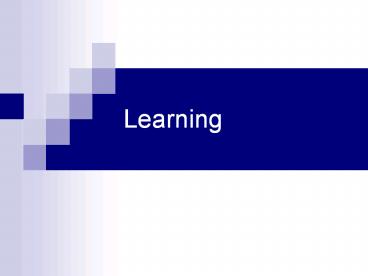Learning - PowerPoint PPT Presentation
1 / 27
Title:
Learning
Description:
Learning What is learning? the process by which experience or practice results in a relatively permanent change in behavior or potential behavior Learning activity ... – PowerPoint PPT presentation
Number of Views:136
Avg rating:3.0/5.0
Title: Learning
1
Learning
2
What is learning?
- the process by which experience or practice
results in a relatively permanent change in
behavior or potential behavior - Learning activity
3
Classical Conditioning
- A form of learning in which a response elicited
by one stimulus becomes elicited by a previously
neutral stimulus
4
Classical Conditioning
- Terms
- Unconditioned stimulus (US)
- Unconditioned response (UR)
- Neutral stimulus
- Conditioned stimulus (CS)
- Conditioned response (CR)
5
Classical Conditioning
- Temporal contiguity
- Stimulus generalization
- Stimulus discrimination
- Extinction
- Reconditioning
- Spontaneous recovery
- Higher-order conditioning
6
- Come up with at least five examples of learned
(classical conditioning) reaction patterns from
your lives - Example cat comes running when s/he hears the
can opener - Biological constraints on learning
7
- Classical Conditioning
- Events ? outcomes
- Operant Conditioning
- Ones behavior ? outcomes
8
Operant Conditioning
- Reinforcer
- ? likelihood
- Punishment
- ? likelihood
9
A Closer Look at Reinforcement
- Positive reinforcer
- A pleasant event that follows an operant
response, increasing the likelihood that the
response will recur - Negative reinforcer
- Strengthens a given response by removing an
aversive stimuli
10
Punishment
- Positive (Punisher)/Negative (Response Cost)
- Not the same as negative reinforcement
- To be effective, punishment needs to be
- Swift, sufficient, and certain
11
Drawbacks of Punishment
- Punishment cannot unteach unwanted behaviors.
- Punishment can backfire.
- Punishment can teach aggression.
12
Shaping
- Reinforcement of successive approximations to end
goal
13
Schedules of Reinforcement
- Continuous Reinforcement Schedule
- Partial Reinforcement Schedule
14
Partial Reinforcement Schedules
15
Extinction
- Learned responses can weaken and disappear
- In classical conditioning
- Occurs when CS-US pairing lapses
- In operant conditioning
- Occurs when reinforcment is withheld
16
Spontaneous Recovery
- Previously extinguished response reappears
without retraining - In classical conditioning
- CS predicts US again
- In operant conditioning
- Behavior produces old consequence again
17
Stimulus Generalization
- Tendency to respond to cues similar to ones we
have become conditioned to - Classical
- Stimuli similar to CS will elicit CR
- Operant
- Supplying different response to stimulus
18
Stimulus Discrimination
- Learners can be trained not to generalize, but
rather to make a conditioned response only to a
single stimulus. - Classical
- CR is specific to a certain CS-US pairing
- Operant
- Reinforcing only specific responses
19
New Learning Based on Original Learning
- Higher order conditioning
- Conditioning based on previous learning
- Primary reinforcer
- A reinforcer that is rewarding in itself
- Secondary reinforcer
- A reinforcer that acquires its reinforcing power
through association with a primary reinforcer
20
Sensitivity to Rewards/Punishment
- Sensitivity to Punishment
- Score one point for each yes response for all
odd-numbered items - Sensitivity to Reward
- Score one point for each yes response for all
even-numbered items - Scores range from 0-24
- Higher scores ? greater sensitivity
21
Grays Reinforcement Sensitivity Theory
- Behavioral activation system (BAS)
- Behavioral inhibition system (BIS)
22
(No Transcript)
23
Observational Learning
- We can learn by observing a model, without
firsthand experience by the observer - Observational learning
- Social Learning
Theorists - Vicarious
Reinforcement
24
Factors Involved in Observational Learning
- Attention
- Retention
- Production Processes
- Motivation
25
Latent Learning
- Learning happens even when not demonstrated
- Stored internally
- Tolmans rats
26
Cognitive Maps
27
Neuroscience and Learning
- Classical and Operant Conditioning ? limbic
system - Classical ? hippocampus
- Operant ? amygdala































